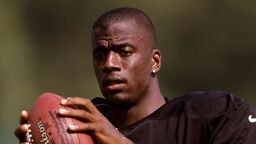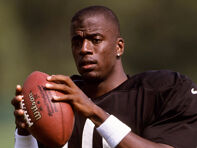“If enough people from different countries want to play men’s netball, it could probably go to the Commonwealth Games — and maybe even the Olympics.”
This is Jimmy Thomson-Boston’s grand vision for the sport he loves. He’s the captain of the England Thorns, who recently finished as runners-up in an international tournament in the Caribbean. Over 20 countries now have men’s teams and there is talk of a potential World Cup.
What’s also special is how gay-friendly the game is.
Thomson-Boston has personally benefited from its inclusive vibes, as have several of his Thorns teammates. You’ll struggle to find any other men’s teams at the highest level in their sport where so many gay and bi players feel comfortable being out.
Get off the sidelines and into the game
Our weekly newsletter is packed with everything from locker room chatter to pressing LGBTQ sports issues.
Related


There are 4,592 rostered players in major men’s US pro sports right now. Zero are out gay athletes. Any questions?
Is it conceivable that, of 4,592 active athletes in major US men’s pro sports, there are no gay or bi players? The answer is obvious.
By Cyd Zeigler | September 30, 2024
It’s a “unique” narrative, says the Thorns skipper, made possible in large part by netball’s origin story.
“Because this sport has come from a women’s perspective initially, it’s very inclusive and caring,” Thomson-Boston tells Outsports.
“Netball’s foundations are that strong female community. They’re allowing us to join in and we’re helping to expand the sport while also supporting the women’s game.”
This evolution encompasses mixed netball, where people of all genders play alongside one another, as well as its men-only version. A welcome by-product is an atmosphere devoid of pressurizing stereotypes, which naturally appeals to LGBTQ people.
Another notable feature, says Thomson-Boston, is the absence of “hyperaggression.” Yes, this sport is still competitive — but not to the detriment of anyone’s enjoyment.
“I think a lot of gay, lesbian and bi players like that, and many decide they want to come and try their hand in our sport because there isn’t going to be that fear.”
‘No drama’ but big appeal
A mistake made over 125 years ago formed the basis for netball’s divergence from basketball.
A New Orleans schoolteacher, Clara Baer, had written to basketball inventor James Naismith asking for a copy of the rules. She thought the dotted lines on his diagram were restricted boundaries, and “women’s basketball” — with no dribbling, bouncing or running with the ball — was born.
A phys-ed instructor in England soon got her students playing the game and it began to spread, particularly in Commonwealth countries. By the 1960s, “netball” had become the more commonly used name and a world governing body was formed. It was recognized by the International Olympic Committee in 1995 and currently comprises 77 member nations.
However, netball has never been an Olympic sport, even though it has been in the Commonwealth Games program since 1998. Its popularity in Australia means there is now a drive to get it into Brisbane 2032 — but when considering new Olympic additions, the IOC is committed to favoring sports with gender parity.
That’s the big picture, and it partly explains why efforts are being made at a high level to elevate mixed and men’s netball. But just as important is the momentum from grassroots, which is allowing LGBTQ people to be visibly represented.
Thomson-Boston is a case in point. Born in Perth, Western Australia, he was a state-league basketball player who found the training schedule difficult due to his work commitments as a radio producer.
A friend invited him to a netball session and after adapting to the sport relatively quickly — “it’s more technical, more disciplined” — he progressed into Australia’s Under-23 men’s team.
He wasn’t out as gay while in basketball.
“The sport is hypermasculine and I would wonder what the boys would think of me if I’d come out or how that would affect the environment. Looking back now, I’m sure I was overthinking it because I know how lovely those boys were and they’re still my friends today.
“But being out at netball never felt out of place. There was no pressure or drama about it and I just felt accepted.”
‘Sassy queens on court’
In 2016, Thomson-Boston took a job in Newcastle in the U.K. At the time, opportunities for men to play netball were fewer than they are now. In North East England, he was limited to training with local women’s teams.
It wasn’t until 2019, when he moved to London for work, that he was able to join an established men’s and mixed club, the Knights. It was clear from “social cues” and conversations that, just like in Australian netball, he could be out as gay with no issues.
During the shutdown, Thomson-Boston and other selected players were allowed to join elite training “bubbles” with elite-level women’s players, improving standards. The England Men’s and Mixed Netball Association (EMMNA) was formed in 2020 and its first national championships were held the next year, with 14 teams — six men’s and eight mixed. At the 2024 nationals last month, the competition had grown to 44 teams — 14 men’s and 30 mixed.
The first men’s national squad, known as the Thorns (the England women’s side are called the Roses), was selected in March 2022 and travelled to Australia later that year for their first international.
“We lost by about 60 goals, but the experience was great!” says Thomson-Boston.
Allow us to reintroduce ourselves. We’re England Men’s & Mixed Netball Association. We’re men, who play netball. And we’re here to stay.
— England Men's & Mixed Netball Association – EMMNA (@EnglandMMNA) July 19, 2024
This campaign marks the first of many, shining a light on men’s netball.
What does netball mean to you? Let us know in the comments 👇 pic.twitter.com/WPsFw1fMFV
Last summer, the Thorns hosted the Jamaica Suns in the first-ever men’s international netball match in England, losing 55-35.
That led to the Thorns being invited to Saint Kitts and Nevis to take part in the Americas Netball Men’s Championship. With Thomson-Boston as captain, they only narrowly lost their opener against Jamaica but beat the USA — their first official international victory — and went on to defeat Antigua & Barbuda, Grenada, the hosts, and St Vincent and the Grenadines, finishing second overall.
Thomson-Boston says the inclusivity within the men’s netball family was evident in St Kitts too. While the Thorns were made aware that homosexuality had only recently been decriminalized there, he says they were made to feel comfortable on the court.
“It was something that was flagged to us, especially to the boys who were travelling who were gay, that it’s not exactly a place where you’d want to be publicly displaying who you are.
“But when we were at the tournament, I didn’t feel any of that, which was nice. It comes down to the netball community that even though some players were from islands where it’s frowned upon to be who you are, we’re going to be gay.
“There was never any hostility towards players who were openly more effeminate than others, and there were some absolutely sassy queens on court, I’ll tell you that!”
He believes that sense of freedom was an ingredient in a successful tournament, as it meant everyone could drop their guard and just enjoy playing.
More broadly, Thomson-Boston is also confident that netball will retain that atmosphere even as it attracts more men’s players, which now appears essential for its growth.
“A lot of the boys who are straight are added in by colleagues and coworkers who are girls, or by their girlfriends, which sort of says to them that you’re stepping into what has been a very safe community space for women as well as for gay and bi people. So they’re going in with that knowledge.”
As for getting men’s competitions added to the Commonwealth Games or even the Olympics, that still looks ambitious for now.
An exhibition men’s tournament at the Netball World Cup in Sydney in 2027 appears a more realistic proposition, while there is also Fast5, a shortened variation of the game. A three-team men’s round-robin will again be included in the annual Fast5 World Series event to be held in Christchurch next month.
For now, Thomson-Boston simply wants more men to discover the sport and what makes it special.
“It’s such a fantastic space to exist and play in. I’ve made so many friends for life through this sport.
“You go through tough times in your life, everyone does. But netball people seem to be the ones from my different friends groups who always reach out to make sure I’m OK.
“I really want everyone else to be able to experience that community.”
Subscribe to the Outsports newsletter to keep up with your favorite out athletes, inspiring LGBTQ sports stories, and more.










































